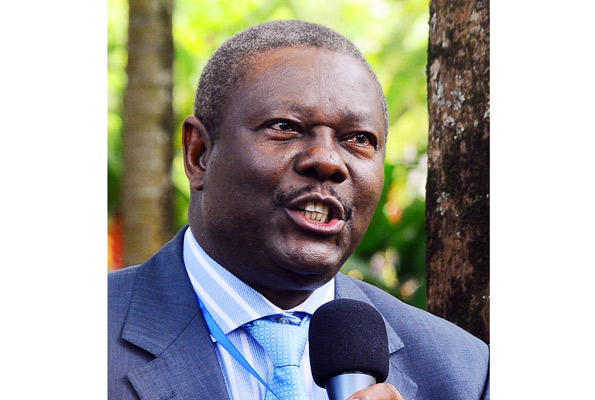Tucked away in one of the tallest buildings in Kampala is the oddly named ‘National Social Security Fund.’ Oddly named because despite its intention to provide a soft landing for salaried employees, NSSF is hardly a pension fund.
Most Ugandans in fact consider its deductions a form of taxation. Recently the NSSF managing director, the former banking official Richard Byarugaba, described the fund, now easily Uganda’s wealthiest purse beside the Central bank, as a “monster.”
What he meant was that despite its lion size, the fund is little more than a pussycat in the economy, meowing, not roaring, scratching and not clawing forward at the opportunities around it. Around the world these days it is fashionable to talk of Africa’s moment. On Sandhill road in the small but extra-wealthy city of Palo Alto where Silicon Valley investors eager for the next big find pitch their ventures, Africa is coming up regularly.
These venture funds chasing things like technology, and increasingly Africa’s natural resources, are not larger than two or three hundred million dollars on average. So it’s not just a case of a little African irony that NSSF, with all its financial muscle, can hardly invest in an economy courted by smaller funds elsewhere.
That is, an economy with oil. To get a full picture of the scale of this irony, consider this. At Shs 3.1 trillion, NSSF represents a value almost five per cent of the Gross Domestic Product. The fund grows at Shs 80bn every month, according to Byarugaba. Its liquidity accounts for 50 per cent of the value of government treasury bills as well as 60 per cent of the float on the Uganda Securities Exchange.
NSSF has another problem. All its investments are safe investments protected by unique “corporate governance” signatures. Bonds, shares or treasury bills are low risk investments.
Several blocks away, one of its high-risk ventures, an ultra modern office block, however, is literary stuck in the mud. The fund pays Shs 50m to maintain the grounds of what should have been a Shs 250bn NSSF Towers. Just Shs 50bn was spent before the project got stuck in the sort of controversies that delay major public projects in Uganda.
When this writer suggested NSSF look to the new and exciting opportunities in Uganda’s emerging oil sector, Byarugaba was unimpressed. One can see why. Tomorrow a paper published by Britain’s leading Think Tank, Chatham House, will list out some basic dos and don’ts to “avoid the resource curse.” Titled ‘Oil in Uganda. International Lessons for Success’, the paper was commissioned by the Open Society Initiative for Uganda.
Like many expert works, Ben Shepherd, its author, has provided various recommendations that will confront the spider web of how development actually works in a country like Uganda or indeed elsewhere in Africa. One of its assumptions is, for example, that an agreement exists on how to do progress or even what progress looks and feels like.
The paper distills practical lessons into a miracle potion of essentials to guard against the resource curse broadly around four pillars, a widely shared commitment to stability and growth, a capable bureaucracy, an engaged public and agreement on spending priorities with oil money.
It is important in this constellation to lift the meaning of an agreement on what constitutes progress to various actors in Uganda’s oil story. This is perhaps why consensus leads Shepherd’s recommendations and spreads through his analysis. A shared commitment to stability and growth is difficult to nail down. If it were successful it would paint a picture closer to Norway, the leading role model for successfully-managed oil resources.
Most experts, including Ugandan trained ones, on the Norwegian case admit that its highly evolved democracy, efficient and committed bureaucracy and an economy already accustomed to managing large national projects were behind its success as an oil producer.
Uganda, by contrast, is a donor Frankenstein that has found oil. The country, long a laboratory of ‘international best practices’, went from an aid-donor darling, a poster child of successful post-war recovery, to the unwanted cousin of the development story, its growth apparently arrested by an overdose of donor-driven policies, too little government and too much politics.
The country’s distended public sector, its raucous political classes and distressed civil service, ravaged by an epidemic of corruption are seen by most ‘experts’ as rooted in one problem: some form of bad government. Confidence in public institutions has been ebbing away steadily.
The debate over the role of the army over the last few weeks shows starkly how institutions of political agreement are in constant flux. There is hardly one national project, including roads, dams or even a national identity project that has been completed on schedule and within budget. The biggest national project today, the Karuma dam, has stalled amid allegations of corruption and mismanagement of the contractual process.
Its predecessor, Bujagali, took over a decade to build. Even if the civil works for that project cost $400m, the cost of capital in this environment put the final bill at $900m, over twice its original budget. Karuma is projected to be the most expensive dam of its size in history as well.
My own thesis is that Uganda’s quagmire is the result of institutional stresses it is facing from a double transition. One transition is a political one. The other is a transition into an oil producer. For oil to work in the way a priest hopes the Sunday sermon does to purge sinners of their life of sin, basing on expert advice like the kind contained in the Chatham House report, a political bargain must be struck by Uganda’s contending classes.
This is the ultimate challenge of ensuring that the stress test on institutions arising from political uncertainty does not atrophy. It is possible that if such an agreement were secured through the existing institutions of democratic decision, then in 10 years when the oil sector matures, it will find a stable environment.
To this the paper rightly observes that unlike many countries that were thrown into the deep end of the resource trap, like Nigeria, Uganda has time on its side. S
hepherd does not just treat as vital the importance of agreement between the principal actors, the government, the opposition and civil society, he considers as equally, if not more important, the securing of a sort of widespread buy-in by the wider society, a form of social contract that in the case of oil revolves on how much Ugandans participate through informed conversation on the spending priorities of a government entrusted with massive oil revenues.
“A population that understands how revenues are being spent is more likely to work with the government rather than against it,” he writes.
Put differently, however, very rarely is a common vision of progress the basis of political consensus. And so on the eve of oil production, you have a workers’ savings fund like NSSF that cannot invest because of the turbulent politics imposes on wealth creation and a political class still sorting itself out.
The good news is that with oil revenues over a decade away, Ugandan decision makers have many opportunities to reflect on the risks of oil. These international lessons can still be well-learnt.
The author is a writer and journalist based in Kampala. He is a 2012-13 Open Society fellow.
Published in the Observer Monday February 4th.










